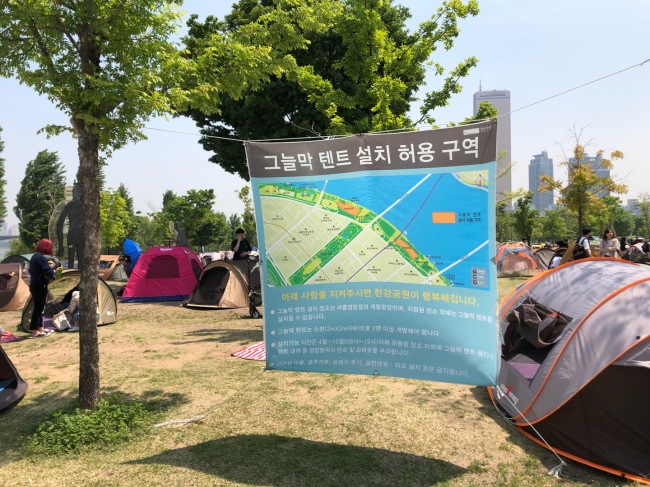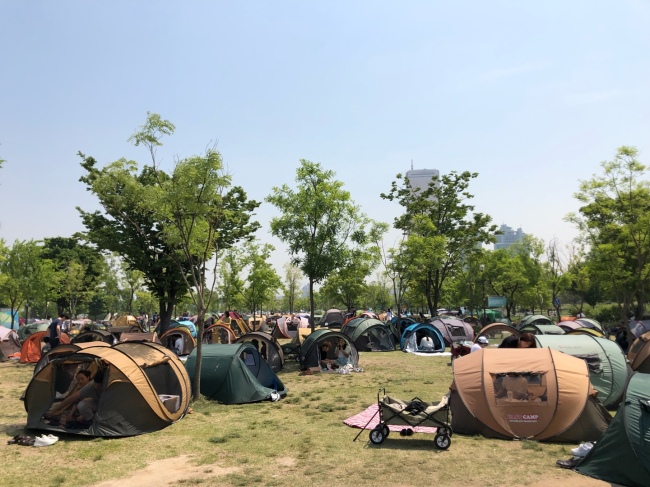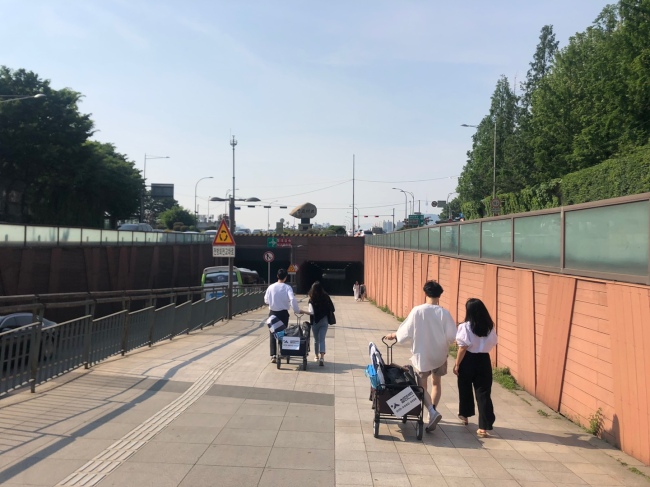[From the scene] Tent regulations in Hangang parks trigger controversy
By Ock Hyun-juPublished : May 20, 2019 - 18:05
On a sunny Saturday afternoon, Yeouido Hangang Park in southwestern Seoul was packed with people seeking to enjoy the greenery at outdoor picnics.
A sea of tents is a familiar sight along the riverside parks -- but this time, the tents had to be squeezed into a smaller space due to new regulations from the Seoul Metropolitan Government.
As of April 22, tents are allowed only in designated zones within the riverside parks until 7 p.m., and must remain open on at least two sides at all times.
A sea of tents is a familiar sight along the riverside parks -- but this time, the tents had to be squeezed into a smaller space due to new regulations from the Seoul Metropolitan Government.
As of April 22, tents are allowed only in designated zones within the riverside parks until 7 p.m., and must remain open on at least two sides at all times.

The requirement to keep tents open has drawn some complaints, opening up debate over how far the government can restrict personal freedom and privacy for the public interest.
What the regulations are about
The Seoul Metropolitan Government laid out plans in late April to designate tent zones, part of its efforts to keep the Hangang parks clean and encourage a “healthy” camping culture.
Tents are now allowed from 9 a.m. to 7 p.m. at 13 tent zones in 11 riverside parks -- including two in Yeouido Hangang Park and two in Banpo Hangang Park. Tents must be no more than 2 meters tall and 2 meters wide.
A total of 155 people are overseeing the implementation of the new rules, and those who violate them could face fines of up to 1 million won.
As for reasons to designate tent zones, the city government cited damage to the riverside parks, the generation of massive amounts of trash and public concerns over “inappropriate” behavior in closed tents in public spaces.
“Hangang parks are public spaces shared by everyone. They are not for private use,” said Jung Soo-yong, who is in charge of projects along the Han River, citing Korea’s current River Act.
Under the River Act, setting up tents and camping out in the riverside parks was originally outlawed.
But when citizens raised complaints over a lack of shade in the parks to avoid the blazing sun, the government allowed the use of shade tents in 2004.
In recent years, camping out with Korea’s signature chicken and beer has gained popularity, leading to a spike in the number of visitors and tents. That in turn led to complaints over littering and sexual behavior in closed tents.

“Last year, the Hangang parks were like tent camps. The nature of the parks was severely damaged and the parks ended up being filled with trash at the end of each night,” he said.
As part of the plan to keep the parks clean, the city government also laid out cleaning guidelines as well as plans to restrict the distribution of flyers for food delivery services and to collect trash more frequently.
The number of people heading to the riverside parks has almost doubled over 10 years -- from 40 million in 2008 and 75 million in 2017, with one person visiting a riverside park seven times per year on average, according to the municipality’s data.
Yeouido Hangang Park attracts the most visitors, with about 30 percent of parkgoers choosing it.
Amid the increase in the number of visitors, the amount of trash generated in the riverside parks has also risen more than 12 percent in a short time -- from 3,806 metric tons in 2015 to 4,832 in 2017.

How people react
The regulations drew mixed reactions from parkgoers.
While the city government stressed the need to reduce the amount of trash, those interviewed by The Korea Herald said the main purpose of the regulations was to crack down on lewd acts in closed tents.
“It is good that the government enforces some regulations for the parks’ users,” said Lee Myung-sook, 51, a Seoul resident who was taking a rest on a bench at Banpo Hangang Park.
“There have been too many closed tents and who knows what they do inside them. … There are children in the park and it is a public space.”
Joshua Hall, 29, an English instructor from the US, shared that perspective.
“I think it’s not unreasonable for the government to ask people to open their tents at least a little bit,” he said. “The parks are definitely a public space and it’s probably in the best interest of the public to keep those spaces family-friendly.”
Others said it was excessive for the government to dictate what they viewed as personal choices, such as where to and how to set up tents.
“The intention is good, but I don’t like the government forcing us to open the tent even when we don’t want to,” said Lee Jin-woo, 24, who was drinking beer with his girlfriend in front of a tent at Yeouido Hangang Park.
Lee Soo-yeon, 20, a student who was installing a tent with her friend, questioned the effectiveness of the rules.
“If the government wanted to prevent lewd acts, there should be an awareness-raising campaign (rather than requiring the tents to remain open),” she said.
There were also practical reasons to complain about the new rules.
“In the evenings, we might want to avoid strong winds and keep the tent closed,” Lee said.

Jin Jung-won, 34, who was playing with her 4-year-old at the park, said it was getting more difficult to find a good spot because the tent zone was too crowded.
“Tents are all just set up right next to each other, so it is more crowded than it used to be (before the regulations),” she said. “I can even hear others’ conversations. I don’t know whether it is right for the government to go as far as enforcing such rules.”
For now, the municipality has no plans to expand the tent zones.
Those running camping gear rental services at the parks complained that the new regulations had taken a toll on their business.
“We saw a drop in the number of people borrowing tents. … I would say about 30 percent,” said Park Tae-min, who was renting camping gear at the entrance to Yeouido Hangang Park.
“They cite inappropriate behavior in closed tents, but why do others have to suffer because of a few exceptional cases?” he asked. “And trash? The tent regulations would do nothing to reduce the amount of trash.”
Three weeks into the enforcement of the revised rules, not a single person has yet been slapped with a fine, according to the city official Jung.
“We are focusing on informing the park users of the new rules for now,” he said. “The majority of the citizens have been very cooperative.”
By Ock Hyun-ju (laeticia.ock@heraldcorp.com)
-
Articles by Ock Hyun-ju









![[Graphic News] More Koreans say they plan long-distance trips this year](http://res.heraldm.com/phpwas/restmb_idxmake.php?idx=644&simg=/content/image/2024/04/17/20240417050828_0.gif&u=)
![[KH Explains] Hyundai's full hybrid edge to pay off amid slow transition to pure EVs](http://res.heraldm.com/phpwas/restmb_idxmake.php?idx=644&simg=/content/image/2024/04/18/20240418050645_0.jpg&u=20240419100350)







![[KH Explains] Hyundai's full hybrid edge to pay off amid slow transition to pure EVs](http://res.heraldm.com/phpwas/restmb_idxmake.php?idx=652&simg=/content/image/2024/04/18/20240418050645_0.jpg&u=20240419100350)

